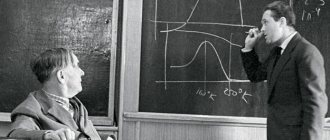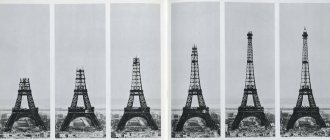Aphorisms of Dmitry Mendeleev
- Know how to always transfer yourself to the point of view of an opposing opinion - this is true wisdom.
- School is a workshop where the thoughts of the younger generation are formed; you must hold it tightly in your hands if you do not want to let the future slip out of your hands.
- Burning oil is like burning a stove with banknotes.
- Hypotheses make scientific work easier and correct - finding the truth, just as a farmer's plow makes it easier to grow useful plants.
- Everything comes only through work. Everything is due to human labor, this is the slogan of history.
Aphorisms, quotes, sayings, phrases - Mendeleev D.I.
- Science fights superstitions like light fights darkness.
- Burning oil is like burning a stove with banknotes.
- Without clearly intensified hard work, there are no talents or geniuses.
- All the pride of a teacher is in his students, in the growth of the seeds he sows.
- Everything comes only through work. Everything is due to human labor, this is the slogan of history.
- It is impossible to foresee the boundaries of scientific knowledge and prediction.
- Science begins as soon as they begin to measure. Exact science is unthinkable without measure.
- I’m surprised at what I haven’t done in my scientific life. And I think it was done well.
- The highest goal of politics is most clearly expressed in the development of conditions for human reproduction.
- What kind of chemist I am, I am a political economist. What is there “Fundamentals of Chemistry”, but “Sensible Tariff” is another matter.
- Wealth and capital are equal to labor, experience, frugality, they are equal to a moral principle, and not a purely economic one.
- A factory or factory in every community is the only thing that can make the Russian people rich, hardworking and educated.
- Capital is only that part of wealth that is devoted to industry and production, but not to speculation and resale.
- The legitimate degree of national pride, which constitutes love for the fatherland, must be deeply distinguished from arrogant self-adoration.
- It is impossible not to touch faith. It is the basis of religion, and any religion in your day is a crude and primitive superstition. Superstition is confidence not based on knowledge.
- Calm modesty of statements usually accompanies what is truly scientific, but where they scathingly and with judicial techniques try to silence any contradiction, there is no true science.
- In my dream I clearly see a table where the elements are arranged as needed. I woke up, immediately wrote it down on a piece of paper and fell asleep again. Only in one place did an amendment become necessary later.
- Nationalism needs most of all to accept the principle of tolerance, that is, to renounce all arrogance, in which there is an obvious abyss of evil, and therefore in these types of matters it is most practical to patiently wait for the course of what is happening.
- In total, more than four subjects included my name, the periodic law, the study of the elasticity of gases, the understanding of solutions as an association, and “Fundamentals of Chemistry.” This is my wealth. It was not taken from anyone, but produced by me.
- This connection between ancient superstitions and new teaching is the whole secret of interest in spiritualism. Would they write and talk so much about any other learned heteroglossia - the spirit, the nanny and, dear to many, the childhood of peoples, were not standing behind here.
- Science is a common property, and therefore justice requires that the greatest scientific glory be given not to the one who was the first to express a known truth, but to the one who managed to convince others of it, showed its reliability and made it applicable in science
- It is necessary with special persistence to end all remnants of the landowner relationship that still exists everywhere in the Urals in the form of peasants assigned to factories. The administration interferes with small enterprises, but the true development of industry is unthinkable without free competition between small and medium-sized manufacturers and large ones.
- The fruits of my labors are, first of all, scientific fame, which constitutes pride - not just my personal, but also the general Russian one. The best time of her life and her main strength was teaching. Of the thousands of my students, many are now prominent figures everywhere, professors, administrators, and when I met them, I always heard that I believed the good seed in them, and was not simply serving a duty. My third service to the Motherland is the least visible, although it has bothered me from a young age to this day. This is service to the best of our ability and ability for the benefit of the growth of Russian industry.
Who is the author of the myth about the sleepy nature of Mendeleev's discovery?
Most likely, this story was born at the suggestion of Alexander Inostrantsev, professor of geology at the University of St. Petersburg. In his numerous letters, he says that he was very friendly with Mendeleev. And one day the chemist opened his soul to the geologist, literally telling him the following: “Obviously, I saw in a dream a table in which the elements were arranged as needed. I woke up and immediately wrote down the data on a piece of paper and went back to sleep. And only in one place did editing then become necessary.” Inostrantsev subsequently often retold this story to his students, who were very impressed by the idea that to make a great discovery it is enough just to fall asleep deeply.
More critical listeners were in no hurry to take the above anecdote on faith, since, firstly, Inostrantsev was never such a bosom friend of Mendeleev. Secondly, the chemist generally opened up to few people; he often joked with his friends, and did it with a more than serious expression on his face, so that those around him often could not understand whether this or that phrase was thrown seriously or not. Thirdly, Mendeleev said in his diaries and letters that from 1869 to 1871 he made not one, but many corrections to the table.
What is Dmitry Mendeleev famous for: 10 facts from the life of the Russian scientist
More details
Mendeleev's statements about chemistry. Mendeleev D.I.
- Science has long ceased to shun life and has written on its banner: “The scientific sowing will sprout for the people’s harvest.”
- Calm modesty of statements usually accompanies what is truly scientific, but where they scathingly and with judicial techniques try to silence any contradiction, there is no true science.
- A theory that is not verified by experience, despite all the beauty of the concept, loses weight and is not recognized; practice that is not based on balanced theory finds itself at a loss and loss.
- Hypotheses make scientific work easier and correct - finding the truth, just as a farmer's plow makes it easier to grow useful plants.
- Scientific discoveries are rarely made immediately; usually the first heralds do not have time to convince them of the truth of what they have found; However, we must not forget that they can only appear thanks to the work of many and the accumulated amount of data.
- It is impossible to foresee the boundaries of scientific knowledge and prediction.
- People, gradually studying a substance, master it, make more accurate and accurate predictions in relation to it, justified by reality, use it more widely and more often for their needs, and there is no reason to see anywhere the line between knowledge and possession of a substance.
- Striving to know the infinite, science itself has no end and, being universal, in reality inevitably acquires a national character.
- Without clearly intensified hard work, there are no talents or geniuses.
- Only that teacher will act fruitfully on the entire mass of students who is himself strong in science, possesses it and loves it.
- Teachers, as local luminaries of science, must stand at the full height of modern knowledge in their specialty.
- All the pride of a teacher is in his students, in the growth of the seeds he sows.
- The school is an enormous force that determines the life and fate of peoples and the state, depending on the main subjects and the principles embedded in the school education system.
- Conversation and words are needed, but they are only the beginning, the whole essence of life is in deeds, in the ability to move from words to deeds, in their coordination.
- Without clearly intensified hard work, there are no talents or geniuses.
- Everything comes only through work. Everything is due to human labor, this is the slogan of history.
- A person is the more perfect the more useful he is for a wide range of public and state interests.
- Science fights superstitions like light fights darkness.
- Burning oil is like burning a stove with banknotes.
- Without clearly intensified hard work, there are no talents or geniuses.
- All the pride of a teacher is in his students, in the growth of the seeds he sows.
- Everything comes only through work. Everything is due to human labor, this is the slogan of history.
- It is impossible to foresee the boundaries of scientific knowledge and prediction.
- Science begins as soon as they begin to measure. Exact science is unthinkable without measure.
- I’m surprised at what I haven’t done in my scientific life. And I think it was done well.
- The highest goal of politics is most clearly expressed in the development of conditions for human reproduction.
- What kind of chemist I am, I am a political economist. What is there “Fundamentals of Chemistry”, but “Sensible Tariff” is another matter.
- Wealth and capital are equal to labor, experience, frugality, they are equal to a moral principle, and not a purely economic one.
- A factory or factory in every community is the only thing that can make the Russian people rich, hardworking and educated.
- Capital is only that part of wealth that is devoted to industry and production, but not to speculation and resale.
- The legitimate degree of national pride, which constitutes love for the fatherland, must be deeply distinguished from arrogant self-adoration.
- It is impossible not to touch faith. It is the basis of religion, and any religion in your day is a crude and primitive superstition. Superstition is confidence not based on knowledge.
- Calm modesty of statements usually accompanies what is truly scientific, but where they scathingly and with judicial techniques try to silence any contradiction, there is no true science.
- In my dream I clearly see a table where the elements are arranged as needed. I woke up, immediately wrote it down on a piece of paper and fell asleep again. Only in one place did an amendment become necessary later.
- Nationalism needs most of all to accept the principle of tolerance, that is, to renounce all arrogance, in which there is an obvious abyss of evil, and therefore in these types of matters it is most practical to patiently wait for the course of what is happening.
- In total, more than four subjects included my name, the periodic law, the study of the elasticity of gases, the understanding of solutions as an association, and “Fundamentals of Chemistry.” This is my wealth. It was not taken from anyone, but produced by me.
- This connection between ancient superstitions and new teaching is the whole secret of interest in spiritualism. Would they write and talk so much about any other learned heteroglossia - the spirit, the nanny and, dear to many, the childhood of peoples, were not standing behind here.
- Science is a common property, and therefore justice requires that the greatest scientific glory be given not to the one who was the first to express a known truth, but to the one who managed to convince others of it, showed its reliability and made it applicable in science
- It is necessary with special persistence to end all remnants of the landowner relationship that still exists everywhere in the Urals in the form of peasants assigned to factories. The administration interferes with small enterprises, but the true development of industry is unthinkable without free competition between small and medium-sized manufacturers and large ones.
- The fruits of my labors are, first of all, scientific fame, which constitutes pride - not just my personal, but also the general Russian one. The best time of her life and her main strength was teaching. Of the thousands of my students, many are now prominent figures everywhere, professors, administrators, and when I met them, I always heard that I believed the good seed in them, and was not simply serving a duty. My third service to the Motherland is the least visible, although it has bothered me from a young age to this day. This is service to the best of our ability and ability for the benefit of the growth of Russian industry.
It is difficult to find a chemist like D.I. Mendeleev, about whose life and scientific work there would be so many statements.
Akade mick
N.D.
Zelinsky
said:
“Highly talented and brilliant people are born, but education is also extremely important in such cases .
Dmitry Ivanovich always noted the influence of his mother on his upbringing, remembering her with special feeling and reverence.
One of Mendeleev’s best works, “On Aqueous Solutions,” is dedicated to his mother.”
Corresponding Member of the USSR Academy of Sciences A.F. Kapustinsky
O . He further pointed out: “D.I. Mendeleev was a brilliant Russian scientist who devoted all his strength to serving his country and his people, glorifying our domestic chemistry in all corners of the earth. In all books of general chemical content, the works of Mendeleev occupy a place of honor, since outside of them there is no modern chemical science, without which the civilization of the 20th century itself is unthinkable.”
“No matter how diverse the creative life of outstanding scientists is,” noted Kapustinsky, “one work of dominant significance almost always stands out in it, most clearly characterizing the activity of a scientist. Such work in the life of D.I. Mendeleev was the creation of the periodic law of chemical elements. In it the creative genius of the famous Russian scientist reached its culmination.” He continued: “Speaking about the work of Mendeleev, one cannot fail to recognize the primacy of the periodic law, in the creation of which the power of his brilliant mind, his experience, his versatile erudition, his gift of foresight and broad generalizations that made him one of the immortal creators of chemical science."
Chemist, philosopher and historian of science, academician B.M. Kedrov
wrote:
“The most characteristic features of Mendeleev as a person, as a citizen and as a scientist were his love and devotion to science and his homeland.
When he was given scientific honors, he always said that these honors were important not for the sake of his personal glory, but for the sake of the glory of the Russian people, the Russian name.” About the periodic law, Academician Kedrov said: “The building of the periodic law, built on and developed, formed a solid foundation for the entire modern doctrine of matter. Without him, development in the 20th century would have been unthinkable. nuclear physics and astrophysics, chemistry and geochemistry, as well as many other areas in the science of matter. And – who knows? “Perhaps many, many years later, our descendants, celebrating the upcoming anniversaries of the discovery of the periodic law, will each time discover that Mendeleev’s ideas continue to live in science, and with them, the one who gave them to the world gains immortality.” Kedrov also made the following statement: “The same periodic law helps to study the distribution of matter in the Universe, starting from various spheres of our planet and ending with other celestial bodies and their systems, as well as the processes of synthesis and decay of chemical elements occurring in celestial bodies (the Sun and stars ) and interstellar space. In a word, Mendeleev’s law is one of the cornerstones of all modern natural science, it is the core of the modern doctrine of matter - from elementary particles to cosmic bodies.”
About the life of the scientist, Kedrov wrote: “Mendeleev’s life is work, work and again work, inspiring scientific feats and bringing the greatest joy of creativity, but at the same time taking all the strength of a person, all his spiritual potential, all his soul and all his heart. And when the image of Mendeleev appears before our mind’s eye, it is first of all as a great worker of science.”
Academician A.N. Nesmeyanov
O.
And the famous physical chemist and metallurgist Academician A.A. Baykov
emphasized:
“D.I. Mendeleev is one of the greatest scientists in the field of natural science, and his name will forever be preserved in history along with the names of Archimedes, Copernicus, Newton, Lomonosov, Lavoisier, Faraday, Darwin, Pavlov and other equally great names.
Mendeleev’s numerous works relate to various departments of science, and everywhere he left a deep mark, but in the field of chemistry, Mendeleev’s genius manifested itself in all its fullness and in all its greatness.” Mendeleev, as contemporaries noted, was a wonderful teacher and lecturer.
“D.I. Mendeleev made a great contribution to the teaching of chemistry
by compiling educational books on all branches of chemistry, as well as by the nature of his teaching
,” noted the famous Russian chemist, one of the active figures of the Russian Chemical Society,
N.A. Menshutkin,
Assistant to Dmitry Ivanovich Mendeleev, later academician V.E. Tishchenko
recalled: “
And in terms of the content, Mendeleev’s lectures were original: they were enlivened by frequent digressions in the field of other sciences - physics, astronomy, biology, geology, in the field of application of chemistry in industry, in the field of the history of chemistry, etc. Mendeleev amazed us with the breadth of his knowledge, and At the same time, he taught that this is why we study, so that later we can bring the light of knowledge to our homeland, develop its countless natural resources, and raise its well-being and independence.”
Academician V.L. Komarov
, President of the USSR Academy of Sciences in 1936–1945, said:
“When D.I. Mendeleev was a professor at St. Petersburg (now Leningrad) University in the seventies of the last century, his audience was bursting with listeners. To take a place on the desk, students often climbed up an hour or two before the start of the lecture, stood in the aisles, and sat on the window sills. Even lawyers, who generally had a very cool attitude towards university studies, considered it their duty to listen to two or three lectures by Mendeleev.”
Academician V.I.Vernadsky
, who listened to Mendeleev’s lectures, emphasized:
“At his lectures, we seemed to be freed from the grip, entered a new wonderful world, and in the crowded 7th auditorium, Dmitry Ivanovich, lifting us up and arousing the deepest aspirations of the human personality for knowledge and its active application, in very many he aroused such logical conclusions and moods that were far from himself.”
Dmitry Ivanovich Mendeleev - born on January 27, 1834, in the city of Tobolsk. An outstanding Russian chemist, his most famous discovery is the periodic law of chemical elements, in accordance with which he compiled the periodic system of elements. Author of fundamental studies in chemistry, physics, metrology, meteorology, economics, fundamental works on aeronautics, agriculture, chemical technology, and public education. Died - January 20, 1907, in the city of St. Petersburg.








